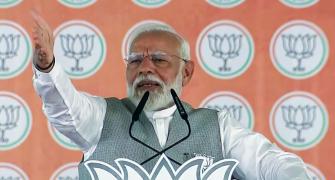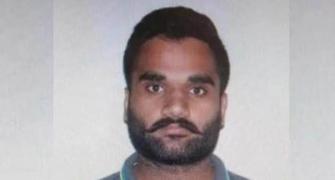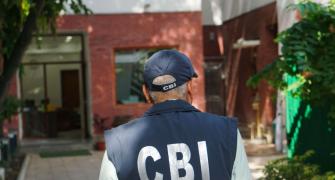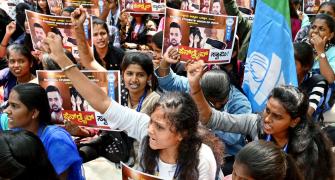 Shilpi Somaya Gowda tells Arthur J Pais how her Secret Daughter was born
Shilpi Somaya Gowda tells Arthur J Pais how her Secret Daughter was born
Shilpi Somaya Gowda's first novel, Secret Daughter, revolves around a daughter who binds an American and Indian family. It is, in Gowda's words, a story about motherhood, loss, identity and culture. The novel and the protagonist, Asha, are caught up between two worlds and two families--one struggling to survive Mumbai's slums, the other grappling to forge a cohesive family despite diverging cultural identities.
Toronto-born Gowda, whose interest in India was kept alive by her immigrant parents and her frequent visits to India, talks about the journey of Secret Daughter.
How did your experience as a volunteer in an orphanage in India nine years ago lead you to Secret Daughter? Were there some people there who you remembered while writing it?
I met three-year-old Yashoda in the orphanage. She was bright and beautiful. What Yashoda impressed upon me most, along with the other children, was her joyfulness. They managed to be happy. I was also told they were lucky to be there; it was better than being on the streets.
But I could not help thinking about how limited their opportunities were and wondering what would happen when they left the orphanage at 16. I have been aware for quite some time about the inequality faced by most women in India and the issues of gender imbalance. According to the United Nations, half a million girls in India are killed each year. And that means 50 million girls and women are missing from India's population.
I lost contact with Yashoda after I left the orphanage. As I wrote on my blog, I have often wondered about her fate, but I know the odds were not in her favor. There is little chance she got a solid education, a good job, a self-sufficient life, if she has even survived all these years. These ideas percolated in my mind, and eventually formed the underlying themes of Secret Daughter. How much of our life is destined--by our gender, our economic class, or the culture we are born into? How much is within our power to change?
Much of the book is about Asha, her inner and outer journeys. What can a reader learn from Asha's experiences?
Like all the characters in the book, Asha is on a journey of identity and self-definition; to find out where she belongs and who her family is in the deepest sense of the word. I believe everyone does this. It's interesting to consider the forces that truly shape our lives.
Asha begins her journey with a fairly narrow world view, and her sense of self grows as she understands more of the world. I think we can all learn more about ourselves and our families by taking a more expansive view.
You grew up in Toronto. How do you know so much about India to write a novel set there?
I was born and raised in Toronto. My family had moved from Bombay to Canada. But we were surrounded by Indian culture at home and in the city. And we visited India once in two or three years. I found the experience quite unique. I would suddenly be with family members, with people pinching my cheeks or hugging me. There was a lot of outward expression of love. Nothing like that happens in Toronto.
Later, when I was 19, I volunteered at the Indian orphanage. It was part of a university project. I could have gone to another country, but I chose India.
That trip also gave me the chance to meet my family on my own. I had been accustomed to my parents escorting me and helping me all the time. I got to hear delightful stories about my family. I heard, for instance, how my father was so much in love with cricket that he often neglected his homework.
How did you prepare for your novel? What were your fears when you set out to write the book?

I took a few writing courses at the Southern Methodist University (Dallas). After that, I started a writer's group with some of the people who studied with me. We were beginners, and I gained a lot from the group. We still meet.
Before writing the novel, I was concerned I would not be able to finish such a marathon project. But once I began, the concern was replaced by the drive to simply write the best story I could.
Excerpt
'She has been trying to muffle her cries until it is unbearable
'
She came to the abandoned hut at dusk, without a word to anyone, when she felt the first unmistakable pulls deep within her. It is vacant, except for the mat on which she now lies, knees drawn up to her chest. As the next wave of pain shudders through her body, Kavita digs her nails into clenched palms and bites down on the tree branch between her teeth. Her breathing is heavy but even as she waits for the tightness to ease in her swollen belly. She steadies her gaze on the pale yellow shadow on the mud floor, cast by a flickering oil lamp, her sole company in the dark hours of night. She has been trying to muffle her cries until it is unbearable to do so anymore. Soon, she knows, with the urge to push, her screams will beckon the village midwife. She prays the baby is born before dawn, for her husband rarely awakens before sunrise. It is the first of only two prayers Kavita dares to have for this child, wary of asking too much from the Gods.
Excerpted with permission from Secret Daughter, Copyright Shilpi Somaya Gowda
Photograph: The cover of Secret Daughter: Inset: Shilpi Somaya Gowda







